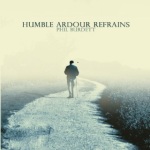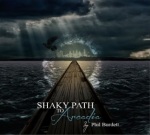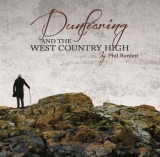 It’s difficult enough working out where to start a Phil Burdett review at the best of times without having to contend with an album that doesn’t actually start or finish anywhere. The clue’s in the song title “Sisyphus on Denmark Street”; the songwriter condemned forever to push a stone uphill. It could be worse; look what they did to Prometheus. The album cycles continuously from the birth of the dawn in “Net of Joy” to the dusk and senescence of “Dotage Train” and back to the beginning again, linked by the phrase ‘heavy miles to go’ in each song. Reincarnation without any upward or downward mobility and inspiration from the unholy poetic trilogy of William Blake, John Clare and Arthur Rimbaud.
It’s difficult enough working out where to start a Phil Burdett review at the best of times without having to contend with an album that doesn’t actually start or finish anywhere. The clue’s in the song title “Sisyphus on Denmark Street”; the songwriter condemned forever to push a stone uphill. It could be worse; look what they did to Prometheus. The album cycles continuously from the birth of the dawn in “Net of Joy” to the dusk and senescence of “Dotage Train” and back to the beginning again, linked by the phrase ‘heavy miles to go’ in each song. Reincarnation without any upward or downward mobility and inspiration from the unholy poetic trilogy of William Blake, John Clare and Arthur Rimbaud.
If you’re part of the generation that doesn’t listen to albums, this isn’t for you; “Psychopastoral” is designed to be heard in a certain order, start to finish and then again and maybe once more, just to be sure that it is actually a work of genius. Phil’s taken a simple approach to ensuring we listen to everything in the intended order; the entire album’s one track with songs connected by musical and lyrical fragments. Does it work? Bloody right it does; at just under an hour, the images, fragments and melodies rush past at breakneck speed then start all over again bringing fresh musical and verbal marvels to discover.
I could spend hours going into minute detail about every aspect of this album, but that’s not going to help anyone, so I’ll try to pick out some of the attention to detail that permeates every aspect of this beautiful piece of work. How about the musicians? The core of this ensemble has been with Phil for a few years now and each one brings their own individual talents to a great ensemble sound. John Bennett (guitar) is one of my local heroes; comparisons with Steve Cropper are more than justified – not showy, but everything fits perfectly. Steve Stott adds colour and texture with bright mandolin and melancholy fiddle and Colleen McCarthy’s backing and lead vocals are a pure and clear foil for Phil’s soulful growl. And of course, Russ Strothard’s melodic bass playing, Lyndon Morgan’s spoken word contributions and the samples and programming contributed by Al Franklinos.
Phil’s voice sounds as good as I’ve ever heard it and the words are as densely packed with meaning and allusion as ever. I’m not going to bore you with my amateur literary criticism, you can delve into the layers of meaning for yourself (there’s a lyric booklet as part of the CD package); you’ll find it packed with autobiographical references both pleasurable and painful alongside the odd skewed musical reference (‘needles of death and the damaged rum’ from “Sisyphus on Denmark Street”).
I’m a huge admirer of Phil’s work, particularly from “Dunfearing and the West Country High” onwards and with “Psychopastoral”, he’s made an unflinching, uncompromising album that flies in the face of convention in its stance on sequencing and playback. There are some memorably catchy songs embedded in the piece, and Phil’s determined that they stay embedded and we hear them as part of the overall creation. It’s an ambitious project, but it’s perfect in every little detail. Favourite album of the year so far? I think so.
“Psychopastoral” is out now you; can order it direct from Phil’s website.
 A long time ago, I really struggled with the musical concept that the most important thing wasn’t the notes, but the space between the notes. I was a bit literal and musically unsophisticated at that time, but I managed to get my head around the idea before it got me into any arguments. The reason I’m inviting you to have a laugh at my expense here is that Phil Burdett’s album “Humble Ardour Refrains” has some wonderful examples of using the space between the notes to create atmosphere and emotion. This is one of two albums that Phil’s releasing simultaneously on Drumfire Records (you can read about “Shaky Path to Arcadia” here) and if you take the two albums together, it’s an extraordinary achievement.
A long time ago, I really struggled with the musical concept that the most important thing wasn’t the notes, but the space between the notes. I was a bit literal and musically unsophisticated at that time, but I managed to get my head around the idea before it got me into any arguments. The reason I’m inviting you to have a laugh at my expense here is that Phil Burdett’s album “Humble Ardour Refrains” has some wonderful examples of using the space between the notes to create atmosphere and emotion. This is one of two albums that Phil’s releasing simultaneously on Drumfire Records (you can read about “Shaky Path to Arcadia” here) and if you take the two albums together, it’s an extraordinary achievement.
He’s used the same musicians (with the addition of flute and sax on this album from Paula Borrell) to produce two very different albums; musically, “Humble Ardour Refrains” has a more acoustic, folky vibe and there’s a much more confessional, intimate feel to the autobiographical material. I’m sure that everyone listening to this will pick out different songs that they love, but my instant favourite was “A Kind of Chalkwell Station Blue”; Russ Strothard’s melodic bass line works perfectly with John Bennett’s clipped guitar and Jack Corder’s congas to create a backing that rolls along seemingly effortlessly under Phil’s sub-apocalyptic vision of Southend and Canvey. When you add Paula Borrell’s meandering flute, the result is sublime. It’s a song that took me back to John Martyn at this very best.
If we’re talking comparisons (and we are), Tom Waits would be proud of the lo-fi stomp of “Jackleg Preacher” with its ‘ruffian choir’ and yuppie-vilifying lyrics; the band can do subtle, but they can also crank it up like a bar band. I should really mention “Chickenwire” as well; I can’t think of any other songwriter who can write a love song (unusual in itself for Phil) that includes the lines ‘This sick life worships morning tide & Satan’s sleeping on the shore, He’ll leave his bitter truths behind – callous, cruel & raw’.
As always, the metaphors range far and wide, from The Bible to French literature with musical references from Dexys to Dylan and Songdog dropped into the mix as well. “Humble Ardour Refrains” is a very personal album exploring childhood and lost innocence, London, absent friends (“Likes of Us”), some very dark times and the mental and physical place that Phil finds himself in at the moment.
Even if you ignore the simultaneous release of “Shaky Path to Arcadia”, this is an astonishingly good album from an artist who really should be much better known than he is. I can’t even choose between the two albums; you should just give yourself a treat and buy both.
“Humble Ardour Refrains” and “Shaky Path to Arcadia” are both out on January 29 on Drumfire Records.
 Every time I hear some delusional, no-talent wannabe on a TV talent show (not often, I admit) it should make me despair for music in the twenty-first century. The reason it doesn’t is that I know about people like Phil Burdett, a genuine visionary who’s about as far as it’s possible to get from the epicentre of what masquerades as the music business today. When I interviewed Phil about eighteen months ago in downtown Leigh-on-Sea, he told me that he was working an album to follow “Dunfearing and the West Country High” as the second part of the “Secular Mystic Trilogy”. Not only that but he was also working on another trilogy that would begin with “Humble Ardour Refrains”. So, on a budget of threepence-halfpenny and some lollipop sticks, he’s recorded two albums for Drumfire Records with some fabulous musicians from the Southend and Canvey area (more about the musicians later) and he’s releasing both of them at the same time.
Every time I hear some delusional, no-talent wannabe on a TV talent show (not often, I admit) it should make me despair for music in the twenty-first century. The reason it doesn’t is that I know about people like Phil Burdett, a genuine visionary who’s about as far as it’s possible to get from the epicentre of what masquerades as the music business today. When I interviewed Phil about eighteen months ago in downtown Leigh-on-Sea, he told me that he was working an album to follow “Dunfearing and the West Country High” as the second part of the “Secular Mystic Trilogy”. Not only that but he was also working on another trilogy that would begin with “Humble Ardour Refrains”. So, on a budget of threepence-halfpenny and some lollipop sticks, he’s recorded two albums for Drumfire Records with some fabulous musicians from the Southend and Canvey area (more about the musicians later) and he’s releasing both of them at the same time.
“Shaky Path to Arcadia” carries on where its predecessor left off, looking west towards the USA from Cornwall, but it’s a metaphorical and musical destination and it’s not the only direction the album goes in, geographically or temporally, before returning to Cornwall to complete the cycle. Without slipping in to ‘sixth-form-literary-criticism’ mode, I’m going to say that there’s a lot going on lyrically and the deeper you dig, the more precious stones you’ll unearth. The lyrics are strewn with references to American music and culture; there’s no mistaking the reference point for “Christmas in Casablanca”, but elsewhere there are references to Joe Hill, Billie Holiday, Dylan, Little Richard and many, many more. There are Dadaist references, travel references (trains, boats and buses and almost a plane) and if you look really closely, a lot of references to Basildon. There’s a lot of autobiography in there, but you need to know where and how to look.
Even without the lyrical content, you could listen to the album and be enthralled by Phil’s rich, powerful vocals and the performances of the band over a wide range of styles. From the mainly acoustic opening song, “Returning to Earth” to the counterpoint vocals in the coda of the album’s closer “I Dreamed I Saw Carl Wilson Last Night”, the band sounds superb. It’s ensemble playing at its finest; particularly on “Hellbound & Innocent” where a melodic bass line from Russ Strothard, an insanely catchy clipped John Bennett guitar hook and Jack Corder’s drums recreate the clickety-clack of the train on the track to perfection. Dee Hunter’s piano is the perfect foil for Phil’s voice on the haunting “Christmas in Casablanca” while Steve Stott’s fiddle on “Come Out Without a Hat (It’s Bound to Rain)” and “New Greyhound Rag” give an authentic country/bluegrass feel to the songs. And let’s not forget Colleen McCarthy’s lovely backing vocals and producer Mark Elliott’s esoteric samples.
“Shaky Path to Arcadia” is an example of how good an album can be when it’s put together by people who love what they do and they do it very, very well. Put the players together with another superb set of songs from the polymath poet of Westcliff-on-Sea and you’ve got a very fine album indeed. Any proper record collection should have some Phil Burdett in it and this is as good a place as any to start. “Humble Ardour Refrains” coming soon.
“Shaky Path to Arcadia” and “Humble Ardour Refrains” are both available to pre-order now from Drumfire Records.
 What a great start we’ve had to 2014. We’ve already reviewed some cracking albums in various genres and now we’ve got another. “Dunfearing and the West Country High” is Phil Burdett’s first album to be released on Twickenham-based Drumfire Records and it’s very, very good. If you’ve seen Phil Burdett play live, you’ll know that he has a powerful, rich baritone voice and is an accomplished acoustic guitar player. He learned to play at the age of six, was in a pre-Depeche Mode band with Martin Gore and has pursued a winding and sometimes messy path through the music scene in the south-east of England ever since.
What a great start we’ve had to 2014. We’ve already reviewed some cracking albums in various genres and now we’ve got another. “Dunfearing and the West Country High” is Phil Burdett’s first album to be released on Twickenham-based Drumfire Records and it’s very, very good. If you’ve seen Phil Burdett play live, you’ll know that he has a powerful, rich baritone voice and is an accomplished acoustic guitar player. He learned to play at the age of six, was in a pre-Depeche Mode band with Martin Gore and has pursued a winding and sometimes messy path through the music scene in the south-east of England ever since.
It’s obvious from the first listen that Phil isn’t just a songwriter; he’s a true poet. You can find any number of musical influences listed in previous reviews but you should probably add James Joyce and Dylan Thomas to that list. A quick word of advice here, don’t download this album, buy the CD; the packaging, designed by Fish Inton, is gorgeous and contains a booklet full of evocative photos and all of the lyrics.
It’s usually a pretty easy job to explain the subject of a song, but it can be a real challenge on “Dunfearing…” as Phil slips sinuously between the mundane and mystical. Even a song as seemingly grounded as “Small Talk at Sullivan’s Diner” descends quickly from the simple narrative to a deeper and darker examination of tortured souls struggling to cope with real life. The songs with a clear narrative thread are inspired by the history of Cornwall and the West Country, “Gothic Miner” and “Fate of Pirates”, for example, while “New York City Call” and “Columbus and Hope” emphasise the area’s historical links with the New World. There’s a batch of songs (“First and Last”, “Song of the Lamp”, “See the Sunset Slow and Beckon True”, “Rimbaud’s Ghost, Chapel Street & Union” and “Winter Halls”) which take inspiration from Phil’s recent Cornish sojourn, and the fatalistic “It’s Where ye Have to Go”.
Which leaves the album’s closing song, “Night Horses of the Wireless Road” to take all of these strands and pull them into an epic, mythical, stream of unconsciousness. The entire album is lyrically dense (both in volume and meanings) and the final song typifies this with references to art, music and fables, before moving abruptly into harsh reality with the news of the death of Jackie Leven, to whose memory the album is dedicated. Musically, “Night Horses…”, has echoes of Neil Young with Crazy Horse at their most laid back or maybe even John Martyn at his best. It has the same unsettling, alienating effect as The Afghan Whigs’ 1996 album, “Black Love”, particularly the closer, “Faded”.
I’m not saying this is an easy listen, but it’s worth putting in the effort. You might even have to do a bit of research on phrases like “mise-en-abyme” (you can look it up for yourself) and some of the more obscure references. Phil’s rough-hewn baritone voice and acoustic guitar (with a hint of Johnny Cash at times) are sympathetically supported by John Bennett (guitars), Steve Stott (mandolin/fiddle), Russ Strothard (bass guitar), Jack Corder (drums), Dee Hepburn (piano), Colleen McCarthy (backing vocals), Wag Porter (fiddle) and Mark Elliott (percussion) throughout the album; the playing isn’t particularly showy, but it creates a perfect backdrop for the modern folk and slight country leanings of the songs.
If you want a particularly geeky fact to impress your friends with, there are nearly thirty drinking references in the album’s lyrics, including pub names, drink names and general drinking terms, including one reference to rehab; you can take what you like from that, but I’m guessing that Phil enjoys a beer. This is an album which visits some very dark places, but closes with a heartfelt farewell to a fellow troubadour as part one of the proposed “Secular Mystic Trilogy” closes.
Out Monday March 3rd on Drumfire Records (DRMFR016).


